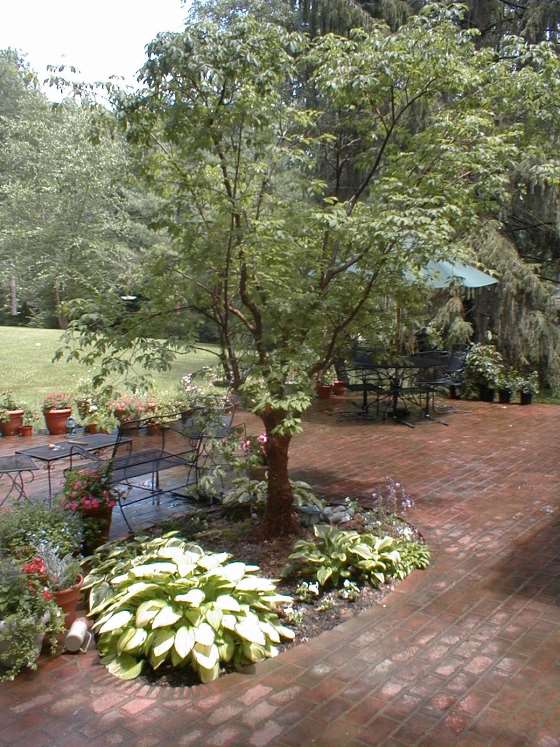A Patio of Concrete – the Right Way

Concrete Patio
DEAR TIM: I am building a new concrete patio. It is important to me that the patio is sized correctly and built to last a lifetime. Do you have some important design tips for patios? Does the end of the slab away from the house have to be thicker than the rest of the slab? How can I prevent the slab from tilting towards the house over time as the backfill along the house settles? Steve C., Riverside, CA
DEAR STEVE: I can't tell you how many enjoyable evenings I have spent on my patio with my wife and family. My wife and I spent a great deal of time planning the patio and it paid off. There is a special area for our table and chair set, a planting bed in one part that has a wonderful paper bark maple shade tree in it, a secondary sitting area with a glide rocker and two chairs, a barbecue grill area and still plenty of extra room to spare. You can achieve the same or similar results if you just take your time and sit and think.
Patios and decks are nothing more than outdoor rooms. The trouble is many people stake out an area 12 feet by 20 feet and think that this is a huge expanse. It does indeed look big without furniture on it. But once you place furniture on a patio this size, it starts to shrink rapidly. The truth is a 12 foot by 20 foot patio is not that big at all.
Start your planning by determining just what you want on the patio. A standard round table with chairs requires an area 12 feet by 12 feet. This will give you enough room to walk around the table as people are sitting in the chairs. Keep in mind that the patio will have paths within it that allow you to cross the patio to get to the house or to the yard. Do not place furniture in these critical areas. Use graph paper and scale cutouts of the furniture to help you plan. Pay attention to your existing dining and living rooms. Note how much space there is between chairs, end tables and your couch.
Your local building department may have special recommendations with respect to code requirements and the actual concrete slab. If there are no code requirements then I would do several things. Because you live in a very mild climate you don't have to worry about frost heaving. It was a concern of mine so I placed three inches of small rounded gravel beneath my slab to prevent water buildup under my patio. I installed a hidden pipe in the gravel at one end of my patio. This pipe extends about ten feet and eventually comes to the surface. This pipe helps keep soil moisture to a minimum and this helps to minimize, if any, frost heave.
You should pour the slab at least five inches thick. I would use nothing less than a 7 bag mix or specify 4,500 pounds per square inch strength. The more cement you have the stronger the concrete will be. Remember cement is the ingredient that holds the sand and gravel together!
In addition, I would use both steel reinforcing and fibermesh secondary reinforcing in the slab. One half inch thick steel reinforcing rods placed at two foot centers in both directions will help make your patio enormously strong. The fibermesh consists of virgin polypropylene fibers that are added at the concrete ready mix plant. These fibers help prevent plastic shrinkage and settlement cracks. Specify about two pounds per cubic yard. Place the steel rods in the center of the concrete. The steel rods will help keep the patio in one piece in the event of a crack or settlement. You can drill into the house foundation and place steel dowels that extend into the slab as well. These will help prevent settlement if the backfill does drop alongside your home.
Be sure the soil beneath the patio is compacted. Consider treating the soil for termites if you are permitted to do so. If you have a well, you need to have a professional exterminator do this chemical treatment. Avoid pouring the concrete on hot, sunny and breezy days. The best concrete pouring conditions, in my opinion, are damp overcast days with the temperature hovering around 57F. The slab must have a clear curing compound applied to it immediately after you have given it its final finish.
Column 371